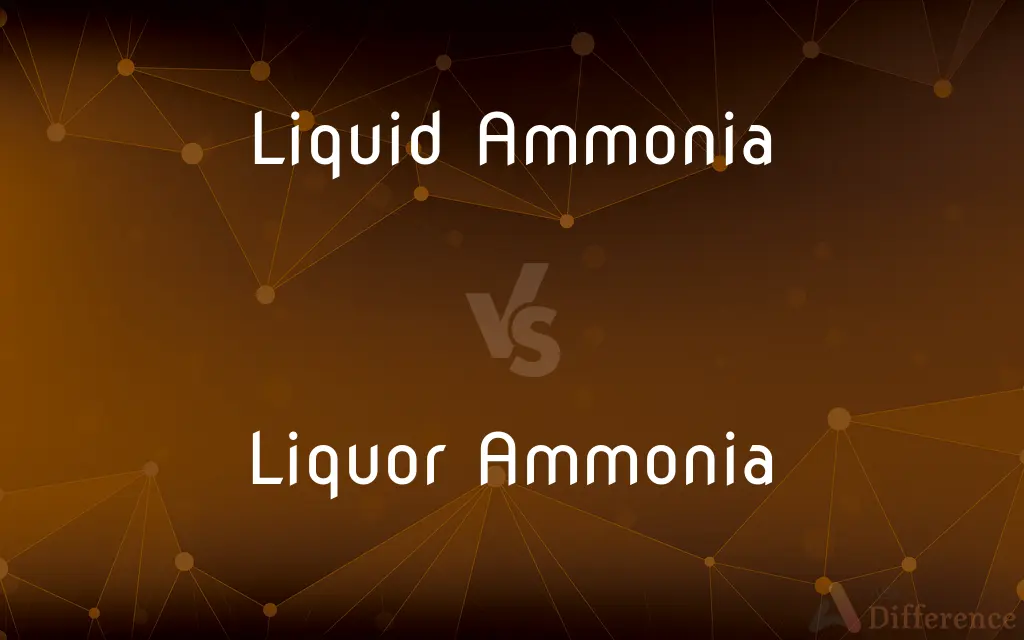Liquid Ammonia vs. Liquor Ammonia — What's the Difference?
By Tayyaba Rehman — Published on November 28, 2023
Liquid ammonia refers to ammonia (NH3) in its liquid state, often used in industrial processes, while liquor ammonia, sometimes known as ammonium hydroxide (NH4OH), is a solution of ammonia in water, commonly used in cleaning.

Difference Between Liquid Ammonia and Liquor Ammonia
Table of Contents
ADVERTISEMENT
Key Differences
Liquid ammonia, being pure ammonia in a liquid state, is predominantly utilized in industrial contexts, such as refrigeration and in the production of fertilizers. Liquor ammonia, commonly referenced in household contexts, is notable for its use in cleaning supplies, usually existing as a solution of ammonia gas dissolved in water, presenting a distinct utility and application compared to its liquid counterpart.
While liquid ammonia is widely used in large-scale applications like the production of nitric acid and other chemicals due to its concentrated and reactive nature, liquor ammonia is often found in smaller-scale, often domestic, settings, due to its ability to effectively clean and disinfect surfaces. Hence, industrial manufacturing prefers the former, while everyday cleaning and minor disinfecting often involve the latter.
Liquid ammonia, due to its potent nature and high reactivity, demands strict storage and handling protocols to ensure safety during its transportation and utilization. Liquor ammonia, being diluted with water, is generally safer to handle and store, making it more applicable for domestic use where stringent safety protocols may be less feasible.
A stark contrast between liquid ammonia and liquor ammonia lies in their chemical formulations and physical states; while the former is characterized by NH3 in a liquid form, the latter, also known as ammonium hydroxide, can be chemically represented as NH4OH, indicating the presence of water and a different chemical composition.
Liquid ammonia, possessing the ability to readily evaporate, is often used in refrigeration systems due to its high latent heat of vaporization. Conversely, liquor ammonia, due to its diluted nature and reduced volatility compared to pure ammonia, is less suitable for such applications but finds its niche in cleaning, neutralizing, and minor disinfecting tasks due to its less aggressive properties.
ADVERTISEMENT
Comparison Chart
Basic Definition
Pure ammonia in liquid form
Ammonia dissolved in water
Typical Use
Industrial processes
Cleaning and mild disinfecting
Handling Safety
Requires stringent safety protocols
Generally safer to handle
Chemical Formula
NH3
NH4OH
Common Applications
Refrigeration, fertilizer production
Household cleaning, neutralizing agent
Compare with Definitions
Liquid Ammonia
A substance utilized in fertilizer production.
Liquid ammonia is a crucial ingredient in manufacturing some fertilizers.
Liquor Ammonia
Also known as ammonium hydroxide.
Liquor ammonia can neutralize acidic solutions.
Liquid Ammonia
Pure ammonia in a liquefied form.
Liquid ammonia is commonly used in industrial refrigeration.
Liquor Ammonia
Sometimes used as a leavening agent.
In some recipes, liquor ammonia serves as a leavening agent.
Liquid Ammonia
Often used in chemical synthesis.
Liquid ammonia is vital in the synthesis of nitric acid.
Liquor Ammonia
Common in household cleaning.
Liquor ammonia can be found in many domestic cleaning supplies.
Liquid Ammonia
Requires cautious storage and handling.
Specialized containers are used to safely store liquid ammonia.
Liquor Ammonia
A solution of ammonia in water.
Liquor ammonia is often used to clean windows.
Liquid Ammonia
Has a high latent heat of vaporization.
Due to its high latent heat, liquid ammonia is effective in cooling systems.
Liquor Ammonia
Milder than pure ammonia.
Liquor ammonia is preferred for safer handling in homes.
Common Curiosities
Can liquor ammonia be used for industrial refrigeration?
Liquor ammonia is not commonly used for industrial refrigeration due to its diluted state.
Is liquid ammonia the same as ammonia gas?
No, liquid ammonia is ammonia in a condensed liquid state, while ammonia gas is in a gaseous state.
Is liquid ammonia safe for household use?
No, liquid ammonia is typically reserved for industrial applications due to its potent nature.
Is liquid ammonia corrosive?
Yes, liquid ammonia can be corrosive and must be handled with care.
How is liquor ammonia made?
Liquor ammonia is made by dissolving ammonia gas in water.
Can liquid ammonia be purchased easily?
Liquid ammonia typically requires specialized handling and isn’t commonly available for public purchase.
Can liquor ammonia be used in cooking?
Yes, liquor ammonia is sometimes used as a leavening agent in cooking.
Can liquor ammonia be made at home?
It's not advisable to produce liquor ammonia at home due to potential risks and inconsistencies.
Is it safe to inhale liquid ammonia?
No, inhaling liquid ammonia can be dangerous and should be avoided.
Is liquor ammonia effective for heavy industrial cleaning?
Generally, liquor ammonia is used for lighter cleaning and may not be suited for heavy industrial cleaning.
How is liquor ammonia disposed of?
Liquor ammonia should be disposed of according to local waste disposal regulations.
Can liquid ammonia and liquor ammonia be used interchangeably?
No, due to differences in concentration and form, their uses are typically distinct.
Is liquid ammonia found in common products?
No, liquid ammonia is generally not found in common household products due to its hazardous nature.
What protective gear is needed for handling liquid ammonia?
Handling liquid ammonia usually requires protective clothing, gloves, and eye protection.
Is liquor ammonia safe for all surfaces?
No, liquor ammonia may damage certain surfaces like brass and should be used cautiously.
Share Your Discovery

Previous Comparison
Primary Memory vs. Secondary Memory
Next Comparison
Allopurinol vs. ColchicineAuthor Spotlight
Written by
Tayyaba RehmanTayyaba Rehman is a distinguished writer, currently serving as a primary contributor to askdifference.com. As a researcher in semantics and etymology, Tayyaba's passion for the complexity of languages and their distinctions has found a perfect home on the platform. Tayyaba delves into the intricacies of language, distinguishing between commonly confused words and phrases, thereby providing clarity for readers worldwide.












































